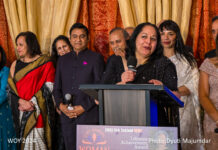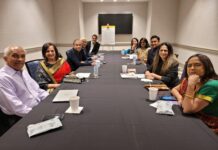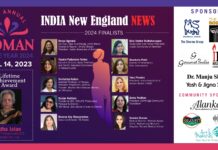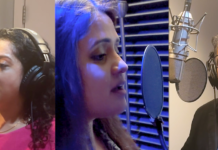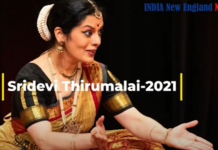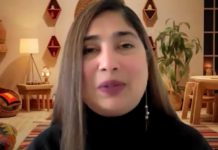CAMBRIDGE, MA–Keerthana Krishnan received her B.Sc. in microbiology from the University of Madras in India, and her M.Biotech and Ph.D. degrees in cancer genomics from the University of Queensland, Australia. Her graduate work focused on studying the role of miRNAs (molecular switches) in breast cancer.
She is currently the Co-Director of the Sequencing Core at Forsyth Research Institute, where the focus is to sequence and aid research studies to identify oral disease causing bacterial pathogens. Aside from her professional career, she has been a volunteer with Association for India’s Development (AID) since 2012, serving as the Secretary of the Boston chapter in 2013 and as the President since.
INDIA New England News: Please tell our readers about your work and what you enjoy most about it?
Keerthana Krishnan: Currently I am Co-Director of the Sequencing Core Facility at Forsyth Institute, which is an Oral health based research Institute, affiliated to Harvard Dental School. At Forsyth we study pathogens that cause oral diseases in humans and focus on strategies to find a cure for them.
Specifically, our group works on sequencing the DNA (and RNA) of disease samples from patients or research models to identify disease causing mechanisms. I obtained my Ph.D in cancer genomics where I used next generation DNA sequencing technology to identify potential cancer causing genes and the role of molecular switches that are potentially involved driving cancer progression to metastasis.
What I enjoy most about my past and current work is the ability to directly affect human health using cutting edge technology. Our work at Forsyth advances the efforts to bring personalized medicine closer to reality.
INE: To which charitable, community and professional group do you belong and why?
KK: I am a volunteer with the Association for India’s Development (AID). I served as the Secretary of the local Boston chapter in 2012-2013 and have been serving as the President of the chapter since 2013.
Prior to my move to Boston my association with charity was that of a distant participant, as one who made donations but did not necessarily worry about learning or being more involved in social change. That changed after joining AID Boston, where the more I learnt about issues affecting the marginalized communities in India, the deeper I wanted to get involved with the process of social change. This iterative process of unlearning and relearning has been a transformative experience.
AID partners with grassroots organizations in India who work on issues faced by the most marginalized communities. We believe that problems are interconnected and therefore the solutions must be too. AID believes in a bottom-up mode of effecting social change — we believe that communities who know their problems the best are also most likely to know the best solutions. We provide solidarity, support and partnership to these communities in their struggle for social justice. In the process, we as volunteers, learn, understand and empathize about the challenges that these people face in their daily struggles for survival and basic needs — things that we take for granted in our daily lives.
INE: What are you hobbies and interest?
KK: I enjoy travelling, visiting new places and cooking.
INE: In what way you feel you have most positively influenced or served the local community and your company/organization and professional field?
KK: AID is a non-profit organization with about 800 volunteers and one paid employee. As with any volunteer-based organization, there is the constant problem of too much to do and too little time. The Boston chapter has numerous events happening through the year (you may remember the Hariprasad Chaurasia concert (2011), Birju Maharaj (2012) Sudha Ragunathan (2014) etc. I enjoy coordinating such events with the rest of the volunteer team and am involved with most administrative functions in the chapter. I also currently coordinate two education projects in Gujarat; Kadam Education Initiative provides educational facilities for displaced children in urban areas. Trust for Reaching the Unreached provides hostel facilities for tribal girls so they can attend school regularly. In order to raise funds and awareness for these and other projects that we support, I have also run two full marathons so far (2013, 2014).
INE: Your rare talent?
KK: These are probably not very rare but certain traits which have helped me along the way are: Time management, confidence and persistence.
INE: Your favorite books?
KK: All of Jane Austen’s novels and the Harry Potter series.
Non-fiction: A People’s History of the United States.
INE: Your favorite quotes?
KK: “Never doubt that a small group of thoughtful, committed citizens can change the world. Indeed that is the only thing that ever has” – Margaret Mead.
“Whatever you do may seem insignificant, but it is most important that you do it” – Mohandas K. Gandhi.
INE: Who inspires you the most?
KK: The entire AID community is an inspiration. Each volunteer with his/her unique talents, passion and conviction to make the world more equitable inspire me greatly (I would particularly like to single out Somnath Mukherji, a long term volunteer, here). In addition, the partners we work with, the activists, who have given up personal aspirations and lucrative careers to pursue equality and justice and most importantly the people — those who struggle for everyday survival and yet go about their lives with a smile and immense courage/strength — these are my daily inspirations.
INE: Your core value you try to live by?
KK: Standing up for what I believe in, commitment to do the best and honesty.




